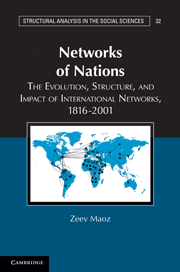Book contents
- Frontmatter
- Contents
- Preface
- Part I What Are International Networks?
- Part II The Formation of International Networks: Theory and Evidence
- 5 Networked International Politics: A Theory of Network Formation and Evolution
- 6 Testing the Theory of Networked International Politics
- 7 Nations in Networks: Prestige, Status Inconsistency, Influence, and Conflict
- Part III The Implications of the Networked International Politics Theory
- Glossary
- Bibliography
- Author Index
- Subject Index
6 - Testing the Theory of Networked International Politics
Published online by Cambridge University Press: 05 June 2012
- Frontmatter
- Contents
- Preface
- Part I What Are International Networks?
- Part II The Formation of International Networks: Theory and Evidence
- 5 Networked International Politics: A Theory of Network Formation and Evolution
- 6 Testing the Theory of Networked International Politics
- 7 Nations in Networks: Prestige, Status Inconsistency, Influence, and Conflict
- Part III The Implications of the Networked International Politics Theory
- Glossary
- Bibliography
- Author Index
- Subject Index
Summary
Introduction
The networked international politics (NIP) theory covers multiple levels of analysis and suggests quite a few hypotheses. In this chapter, I test key aspects of the theory and evaluate its main propositions, focusing on the central propositions concerning network formation, network evolution, and the structural consequences of these processes.
I provide only a general discussion of the empirical strategy in the body of the chapter. My main focus is on the discussion and interpretations of the results. The chapter’s appendix contains a detailed discussion of methodology, measurement, and other technical matters concerning these analyses.
- Type
- Chapter
- Information
- Networks of NationsThe Evolution, Structure, and Impact of International Networks, 1816–2001, pp. 186 - 210Publisher: Cambridge University PressPrint publication year: 2010

